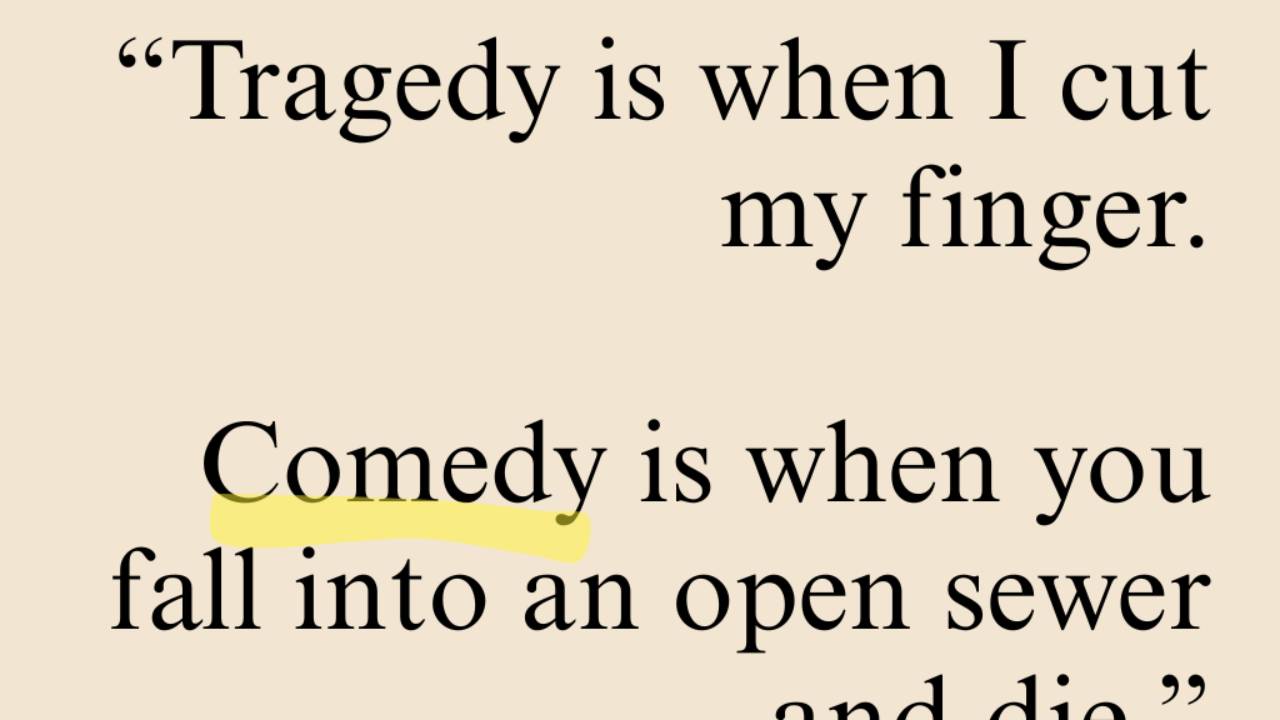Why Comedy Seems Larger Than Life
Aug 11, 2025
This month within Masters of Self-Taping (MOST) is all about Comedy. We are working on specific tools each week in our community meetings and then it will all culminate in a meaty self-tape at the end of the month. Here are some of my observations from last week's class.
There’s something wildly specific about watching a character lose their mind over a parking ticket. Not just annoyed, but unraveling. Spiraling. Like the fate of humanity depends on it.
And honestly? That’s where great comedy lives.
Sometimes comedy writing gives us gold with high stakes situations... Getting abducted by the cartel while trying to spread your mother’s ashes in the Grand Canyon. Losing track of the last 12 hours (and the groom-to-be) while in Las Vegas. Infiltrating a family vacation to win over the love of your life while they all think you’re someone else.
If a person found oneself in any of this situations, it would no longer be a comedy. It would be one of the worst experiences of one’s life.
But, when an audience knows that they’re watching a comedy and that the person isn’t in real danger, we laugh.
We laugh at other people’s pain.
So the high-stakes stuff gives us a bit of a springboard into the heightened world. But what about the low-stakes stuff? How can we craft a heightened world?
Comedy isn’t just about punchlines. It’s about commitment. When we’re given a low-stakes situation within a comedy - ordering soup, applying for a job, dog sitting - one of our jobs is to find the way to instill it with the quality of a nuclear standoff. The higher the stakes, the funnier the scene. But those stakes don’t come from the script alone. They come from the actor’s imagination and a willingness to commit.
Here are three tools I believe can help elevate a comedic moment into something memorable:
1. Replace the Environment
The funniest characters aren’t aware they’re in a comedy. They’re living in a different genre entirely.
A character who’s interrogating someone about a missing stapler isn’t thinking, “I have to be funny.” They’re thinking, “This is Homeland.” In their mind, the office is a federal agency. Every form is a security clearance protocol. Every paper jam? A national threat.
This reframing is what I call “replacing the environment.” You’re not in a cubicle—you’re in a command center. You’re not in a living room—you’re on trial at The Hague. It’s not make-believe, it’s a tool. A mental game that charges the air with urgency and transforms the most mundane scenes into playgrounds for comedy.
Because, in these environments? Almost anything is justified in pursuit of the truth.
This is why Parks and Recreation works. Leslie Knope treats every small-town decision with the gravity of the Pentagon. She’s not joking. And that’s why we laugh.
⸻
2. The Art of Overcommitment
In comedy, subtlety doesn’t always serve you.
One of the most effective tools I see in actors is a willingness to overcommit. To a character’s emotional logic. To the physicality. To maintain the tension in a pause for so long that people get uncomfortable and laugh. It’s not about being loud or big—it’s about being all in.
If your character believes that authorizing a bounce house permit could result in disaster… don’t half-play it. Make it life or death. Let the stakes climb like water in a locked room. Let each line hit like it’s the final straw.
The comedy lives in watching someone spiral with conviction. The moment the actor starts playing it safe or worse, starts playing for the laugh, the whole thing flattens.
Overcommitment isn’t overacting. It’s allowing your rationale to be justified by an extreme belief.
Which leads us to...
⸻
3. Justify the Ridiculous
Comedy isn’t random. Even the most absurd punchlines are built on logic.
That’s the brilliance of shows like The Office. Dwight Schrute isn’t funny. He’s deadly serious about beet farming, workplace protocol, and survival tactics. He justifies every overreaction with airtight (albeit bizarre) internal logic. And that’s why it works.
The same goes for any comedic moment: the more ridiculous the action, the more the character must believe it’s the only appropriate response.
With Dwight, the people around him may roll their eyes, but the character knows he’s right. He’s following the rules. That internal justification turns chaos into comedy.
These tools aren’t about being funny. And they might not be used on every comedic script. But they can help capture the truth in a heightened world. The audience will do the part of making it a comedy.
The laugh doesn’t come from the joke itself. It comes from watching someone fight like hell to protect what they care about… even if what they care about is a red stapler.
Comedy is serious business. That’s what makes it funny.
—J